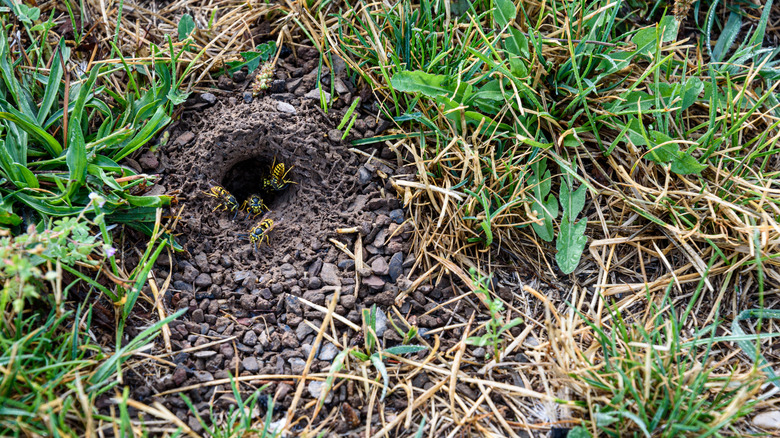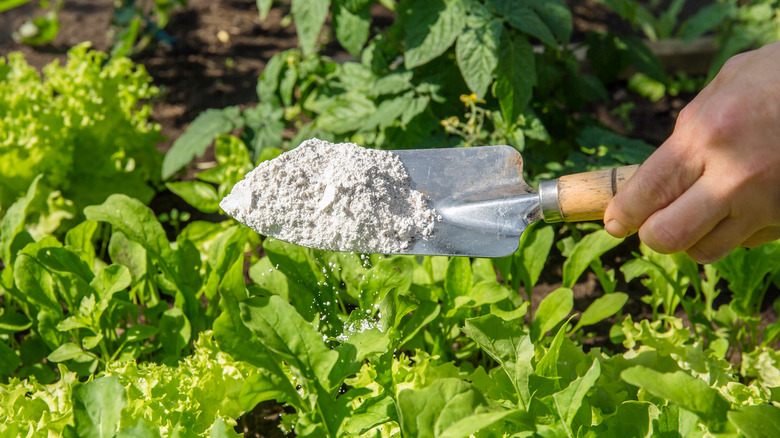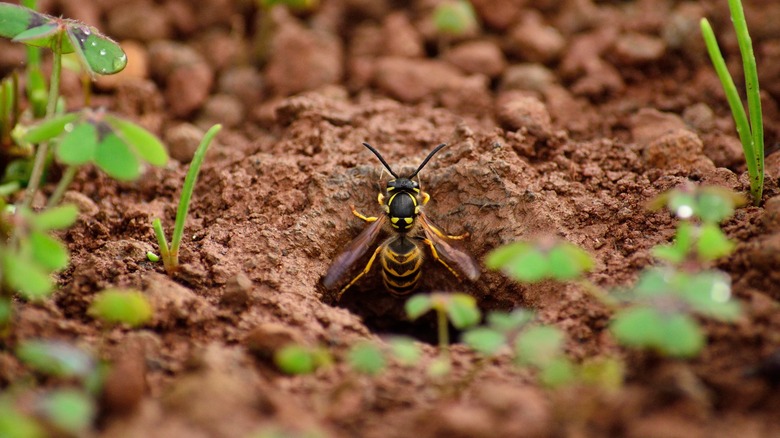The Surefire Ways To Rid Your Yard Of Underground Wasp Nests
As unnerving as it can be knowing wasps are nearby, they are not usually cause for concern. But while they do not typically become aggressive unless disturbed, many of our daily outdoor activities such as mowing the lawn and watering the garden can be interpreted as disturbances, especially if the wasps decide to nest underground. Further, it can be very difficult to see an underground wasp nest until it is too late. As such, most wasp stings from those living underground happen to those who mistakenly find the entrance hole to the nest without thinking anything of it. This can cause barefoot children, curious pets, unsuspecting gardeners, or leisurely loungers to become victims of their stings. Inadvertently disturbing a colony of wasps during your outdoor activities can become particularly dangerous if you or someone in your household is allergic or if there are a lot of wasps that consider your presence to be a threat.
Fortunately, there are measures you can take to rid your yard of wasp nests, should any happen to make a home underground on your property. While prevention is the best form of protection, using diatomaceous earth is one of the most guaranteed and proven ways to get rid of wasps that have laid claim to your lawn. In a pinch, you can also use a method that involves dish soap and water, which should also help minimize the number of wasps.
Using diatomaceous earth on underground wasp nests
Diatomaceous earth is regarded as being one of the best ways to get rid of pests, and wasps are no exception. Made up of microscopic fossilized remains of aquatic organisms, diatomaceous earth is a fine, powdery substance. While it is safe to use around people and pets, the fossilized pieces are razor sharp to smaller insects like wasps, preventing them from coming near treated areas and killing the ones that do. However, while safe to touch, the abrasive dust can irritate your airways if enough is inhaled and can also irritate your eyes if they come into contact with it. Consider wearing a dust mask and protective glasses when using this substance in order to prevent this.
To target underground nests using diatomaceous earth, wait until after nightfall when the wasps are less active and less likely to sting. Dump half a cup into the entrance of the nest and quickly cover it with something solid and sturdy such as a flat, heavy rock. This will trap them inside the nest with the diatomaceous earth and prevent them from escaping (and from coming after you once they notice a disturbance). You should notice a decrease in wasp activity as soon as the next day, though if you have a lot of wasps in the nest, you may need to reapply every few weeks and after periods of heavy rainfall to ensure they are fully gone.
Using soap and water on underground wasp nests
If you do not have any diatomaceous earth on hand, you can use a mixture of dish soap and water. Still working after nightfall when the wasps are less active and less likely to sting you, cover the hole with a screen or a piece of landscaping fabric, then cut a small hole in the middle of it. Mix some soap with a gallon of water and pour it into the hole, or simply squirt the dish soap into the opening and follow up with water from the hose. The soapy water should weigh the wasps' wings down enough to the point where they are weakened, while the fabric will prevent them from flying away, ultimately drowning them and preventing them from reproducing.
Ultimately, if your at-home methods of wasp extermination aren't working or if a lot of wasps have decided to nest underground near your home, the best thing to do is call an expert to come remove them professionally. While it's likely that one or two wasp stings wouldn't be dangerous, if there's a swarm of them hiding beneath the surface of your lawn and they become irritated by any of your DIY methods, this could spell trouble for you and anyone else nearby. Large wasp infestations or a large number of underground nests in your yard likely need extermination beyond what you can do as a non-professional.


